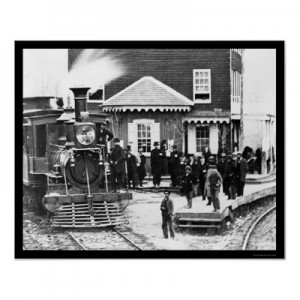
I: 1863
 Abraham Lincoln is on a special presidential train en route to Gettysburg, Pennsylvania. It is November 1863. On the way, his train is scheduled to make a brief stop (6-10 minutes) at the train depot in Hanover, Pennsylvania. When the train pulls into the Hanover depot, a crowd of people are waiting for it. People in the crowd begin to shout for Lincoln to come out and speak. This is the depot below in 1863.
Abraham Lincoln is on a special presidential train en route to Gettysburg, Pennsylvania. It is November 1863. On the way, his train is scheduled to make a brief stop (6-10 minutes) at the train depot in Hanover, Pennsylvania. When the train pulls into the Hanover depot, a crowd of people are waiting for it. People in the crowd begin to shout for Lincoln to come out and speak. This is the depot below in 1863.

If you’re Lincoln, what do you do? Do you go out to speak? What do you say? What do you need to accomplish as a leader in this situation? Can you as the leader stay inside the train and not come out?
Next stop for Lincoln–Gettysburg and the special ceremony to which he was invited to “give a few remarks.”
This is a real-life situation drawn from history. Email me your thoughts on what you think Lincoln as a leader should do. After you’ve done so, look below at the nature of other people’s responses. Then, mozy on over to another spot on my website, The Commonplace Book in the “My Writings” section. I’ve written about what Lincoln did and what happened next. You’ll be astounded. Thanks much for your effort. All the best, Dan
- Lynn’s response: “If I was Lincoln, I would get out and greet the public. I would use the opportunity to be friendly and let the people see that their president wanted to see them just as much as they wanted to see him. He should say a few words to encourage the people about the war and thank them for coming to see him.”
- Steve’s response: “If Lincoln was searching for strength in that moment, he could find it in being himself and interacting with the crowd. In other words, he could provide strength and inspiration to the people gathered, and garner strength and inspiration from them as well. This could really only be done effectively by Lincoln just being Lincoln in the moment.”
- Rich’s response: “Provide a quick appearance and give them some short but very motivating comments concerning the times we are living in and what he expects them all to do as loyal citizens of the United States. Remind the crowd of his appreciation for the loyality they have demonstrated. Press them to remember we are in a conflict that requires them to protect the Union and all that it stands for. Say something to the effect of “Fight and fight hard if attacked by rebel forces; now and in the future. We will not be defeated.” Thanks them all for their support and get back on the the train headed for your ultimate destination.
- Krista’s response: “I suspect that Lincoln would have acknowledged the crowds calls to make an appearance.”
- Lisa’s response: “He was their President and of course should step out to say hello. At this point in history he needed to unify the people of the United States so if I were him I would speak about how the people must come together for the good of all. As a leader not coming out of the train was not an option.”
- Kelly’s response: “He should do what every good leader does…consult with his wife:). Seriously, I agree with everyone else who responded prior to me. One of Lincoln’s greatest qualities as a leader in my mind is his transparency and great empathy for others. His very presence would convey warmth, unity, and assurance regardless of what he actually said from the train. So, yes, yes, by all means, make that connection. Kelly (Dan’s wife:))”
- Jan’s response: “If I were Lincoln in this situation, I would have seen this ‘short stop’ as a nice opportunity to make connections with the people. The formality of the dialog would depend on the situation and surroundings, but connecting with people would definitely be important. Also, if he had a message he was sharing during that time, this would have been a great opportunty to continue spreading the word. Obviously, they didn’t have the speed of social media like we do today, so every chance for ‘face time’ would have been invaluable.”
- Jennifer’s response: “By all means, Lincoln should get out and say a few words to the crowd. If anything, just to reassure them to his commitment to them as president.”
- Alisa’s response: “Based on today’s leadership styles and all that is taught – and indeed my own philosophy, I would say that Lincoln has to show his face, at the very least. I don’t think he needs to give a speech, per se, but he does need to acknowledge the crowd by saying a few words and letting the people see their leader. Now, if I am to be astounded by the results, and I don’t recall hearing about Lincoln being in Hanover prior to Gettysburg, I would venture to guess that perhaps he didn’t come out and show his face or give a speech. I hope that guess is wrong!”
- Brian’s response: “Understanding that the town of Hanover was attacked and taken over by the Confederate cavalry just a few months prior (June 1863), I think you have to at least get out of the car if you’re Lincoln. Additionally, as a leader that is trying to gather support, comfort those who have suffered great loss, and continuously working towards unity, you have to speak to the crowd. This would likely be a few unprepared comments, but all good leaders can speak from the cuff and Lincoln was certainly one that spoke from his heart. I also like the ideas from some of the others…at the very least, get out, mingle with the crowd and if you’re not going to address the entire crowd at once, have simple dialog with the people to let them know you care. At that moment, he has to take the time to let his people know that he CARES about them.”
- Frank’s response: “I tend to agree with those who have responded. I think the context is important. Lincoln was trying to still gain support or continued support for the cause and Union specifically. He most definitely was on his way to honor the sacrifice made by the soldiers but used this event to rally support for the war as a cause to preserve liberty and freedom for the world. So, I think he should speak and remind those in attendance of that broader picture and sacrifices still needed for victory.
- Ben’s response: “Since the speech Lincoln was about to give at Gettysburg would surely reach the Hanover crowd later, there wasn’t any prepared speech or elaborate words needed by Lincoln at this point. I would have went around the crowd, greeting people and showing these people that he is a trustworthy person to be leading them. Just by having brief interaction with the crowd, he can give hope to them and belief in him, a valuable thing in this time. While Lincoln was also giving hope to people through the Gettysburg Address, by investing time in everyday citizens, it shows them that their leader appreciates the heart of their nation, which is the workers and their families.”
- Todd’s response: “Yes, speak, by all means. Here’s what you say from the platform–‘stay united, stay together.’ This is basically what he’s planning to say the next day at Gettysburg anyway. This is the message people need to hear in late 1863.”
- Tim’s response: “Don’t speak formally or informally. Just go into the crowd for a few minutes, shake hands, say hello, wave, and get back on the train. That takes the place of having to say anything from the platform. It prevents the question of speaking from becoming an issue.”
- Travis’s response: “I would speak to the crowd. This is a landmark time of difficulties in America. Difficulties surrounding trust of your government, struggles in trusting of other Americans, irony of war in your homeland between two sides of Americans and a strong stance on a moral dilemma of human equality. The people of America need to see and hear and believe in leadership during these times of confusion and I am on a mission to rally, build trust and make sense of the loss in country and the lives. This and every speaking opportunity are important, although frustrating for the reason/need of the topic, but important to get the country through a dark time. We are on a campaign to rally spirits, provide understanding to why struggles must happen for the country to make it to a better, stronger united free nation.”
- Helen’s response: “staying inside the train is not an option. As a Leader should do, we must manage by “the whites of our eyes” and not hide behind the walls of a train or any other obstacle. Get out, meet and greet, answer questions, acknowledge the people who are there, say a few words and answer questions in an attempt to be transparent. It shouldn’t take long, but the investment of time is worth it especially in what is left behind once the train departs the station.”
- Mike’s response: “there’s no way I wouldn’t get out and say something. I’d speak about current events of the time, the war…”
- James’s response: “Lincoln has to come out to speak for 3 reasons–acknowledge the sacrifice in being there to greet him; bring closure to the disillusioned; and ‘test drive’ the comments he’ll make at Gettysburg.”
- Ron’s response: “He must get out and speak to those who invested their time to see him for a few short moments. His heart must be heavy with the task at hand so showing leadership is not optional.”
- David’s response: Lincoln doesn’t sit still when there is an opportunity to interact. If I am him I would walk out and say something like, ‘thank you for coming out to say hello’ and start shaking hands. I don’t think a grand speech is needed but it’s a good idea to take a few minutes (even if it becomes 20 minutes and the train is late) to interact with those passing by.”
Please reply form goes here







